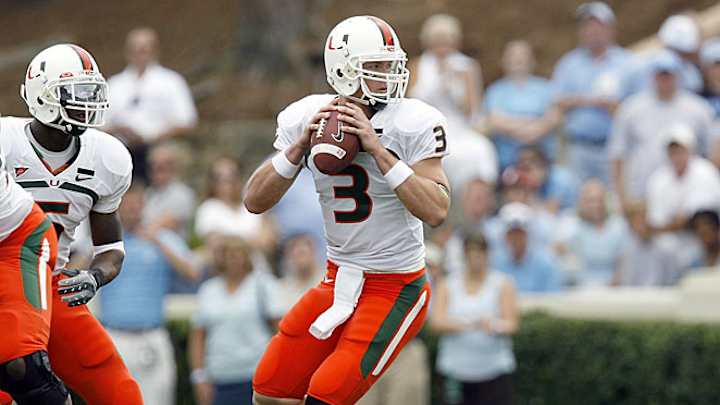Miami wants Wright's testimony out of allegations


CORAL GABLES, Fla. (AP) -- Former Miami quarterback Kyle Wright's testimony to the NCAA is part of the reason the Hurricanes want the case against their athletic department dismissed.
In the motion filed last week with the NCAA's Committee on Infractions, Miami cited six allegations that Wright helped investigators substantiate in a February 2012 interview. But Miami contends that because some of the questions were asked by now-retired NCAA investigator Rich Johanningmeier, at least some of Wright's testimony should not have been included in forming the notice of allegations that the Hurricanes received in February.
Wright, according to Miami's motion, "acknowledged receiving those benefits only after Johanningmeier asked him specific questions regarding the benefits" that the former quarterback received from convicted felon and one-time Hurricanes booster Nevin Shapiro.
And the NCAA, Miami contends, only learned about those benefits - including a trip to a Snoop Dogg concert in 2005 and an overnight trip to the Bahamas - because of the deposition that Shapiro attorney Maria Elena Perez conducted of former Miami equipment-room staffer and Shapiro confidant Sean Allen in December 2011.
That was one of the depositions Perez conducted as part of Shapiro's bankruptcy case under subpoena power while receiving payment from the NCAA for the work performed. The NCAA does not have subpoena power, and has said it struck all the information collected from Perez's depositions of Allen and former Shapiro business partner Michael Huyghue from the notice of allegations against the Hurricanes.
Miami does not believe the NCAA has stricken enough.
"Since Allen was the only witness to those benefits (and Huyghue denied providing any such benefits when he was (impermissibly) deposed), the logical inference is that the enforcement staff never would have asked (Wright) about those benefits had they not improperly received the information from Allen," reads Miami's motion to dismiss.
Wright did not respond to messages seeking comment.
The Associated Press has learned that Wright, a Miami quarterback from 2004 through 2007, appears several times in the notice of allegations against Miami. Wright is one of 48 players the NCAA said received "VIP access and beverage service" from Shapiro at Miami nightclubs between 2002 and 2009. He was also one of 38 players the NCAA said was entertained at Shapiro's home, one of 18 who received invitations to bowling-alley outings from the former booster, and one of seven who dined with him at a Benihana restaurant.
Wright, also according to the notice of allegations against Miami, received at least $1,824 in impermissible benefits "in an effort to secure signing with Axcess Sports," an agency Shapiro was aligned with.
Miami released a redacted copy of the motion to several attorneys last week as well, though the copy actually sent to the NCAA referred to players by name, not "Student 1," which is how Wright was identified in the publicly available motion.
However, Wright is the only person linked to all six allegations that Miami said "Student 1" substantiated with the NCAA.
Miami doesn't only want the Wright interview expunged because of how the information that went into Johanningmeier's questions was obtained, but also because the Hurricanes say NCAA investigator Brynna Barnhart "misled the university as to the circumstances surrounding" Wright's interview.
Miami said it was not told that Wright met with the NCAA until more than two months after his interview, even though the Hurricanes had been present in some way for virtually every interview conducted after the investigation became publicly known in August 2011, when Shapiro's claims were published by Yahoo Sports.
Wright is not among the dozens of athletes listed in that article as having received impermissible benefits from Shapiro.
Barnhart told Miami that Wright "reached out" to Johanningmeier, according to the motion to dismiss. But when interviewed by an attorney for Miami, Wright told the school that in "no way, shape or form did I reach out to the NCAA."
Wright is also quoted in Miami's motion to dismiss as having told the Hurricanes, "I live and work a normal job just like everybody else, and really the last thing I wanted to do was, you know, have my name mixed up in this and have my family's name mixed up in this."
Miami contends that Wright's testimony - and why it remains part of the case - should have been addressed in The Cadwalader Report, which the NCAA ordered in January after realizing the scope of the relationship between Perez and investigators.
"Based upon our review, it is our opinion that the current assertions in the U. Miami Investigative Record are not based on evidence that is derived, directly or indirectly, from the depositions of Mr. Allen or Mr. Huyghue," said the report from attorney Kenneth L. Wainstein, who led the external probe.
Wright, from Danville, Calif., was a five-star recruit but struggled at times in his college career. He finished his four Miami seasons with 38 touchdown passes and 31 interceptions.
Shapiro is serving a 20-year prison sentence for masterminding a $930 million Ponzi scheme. Miami has already missed three postseason football games because of the scandal, and school officials have said repeatedly that self-imposed sanctions like those and a scholarship reduction mean the Hurricanes have been penalized enough.
